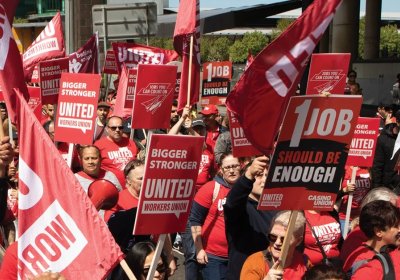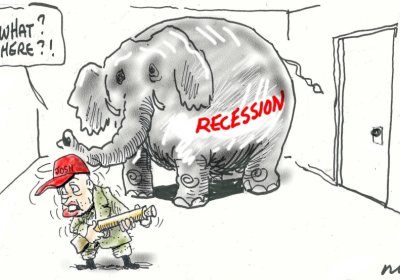Graham Matthews argues that now that the National Disability Insurance Scheme has matured, the federal government wants to disown it, down-size and destroy it.
Graham Matthews
The government is crowing about the economic recovery. But when the pandemic supplement is cut at the end of March, people will be trying to survive on $43 a day. Graham Mathews reports.
The recession, we're told, is over. But, as Graham Matthews details, Australia’s unemployed and underemployed are about to face more pain as the COVID-19 subsidies are withdrawn.
The federal government and employers are using the pandemic recession to further undermine job security and employment conditions. Graham Matthews argues that their “increased flexibility” is our growing insecurity.
Treasurer Josh Frydenberg's economic restructure plans will not only fall way short of what's needed, Graham Matthews argues they are also designed to attack working people.
The Australian economy is set for a significant slowdown in response to the COVID-19 shutdown, with the jobless rate expected to climb to 10%. The question, asks Graham Matthews, is who will pay?
In typical neoliberal style, the federal government’s COVID-19 response is leaving local councils in a ditch, argues Graham Matthews.
While many countries have closed schools as a measure to stem the rate of COVID-19 infection, public schools in Australia are to remain open in stark defiance of the “social distancing” requirements of almost every other aspect of social and economic life. Graham Matthews asks why?
Little more than 10 years after the Global Financial Crisis, the world economy faces another crash. Last time, the trigger was so-called “sub-prime” mortgages; but this time, it is a virulent virus — COVID-19 — writes Graham Matthews.
The sheer scale of the recent bushfires and their timing (during the summer school holidays) have had a crippling impact on many working people, including small business owners, and put the ongoing sustainability of rural communities at serious risk, writes Graham Matthews.
Treasury says the economy is performing “modestly”, Treasurer Josh Frydenberg has dismissed calls for additional stimulus spending & Reserve Bank of Australia chief Philip Lowe predicts growth will return to “trend” over the next year.
So nothing to worry about, right?
National accounts figures released by the Australian Bureau of Statistics (ABS) on September 4 show economic growth was slower over the 2018–19 financial year than at any time in the past 10 years.
- Previous page
- Page 2
- Next page











